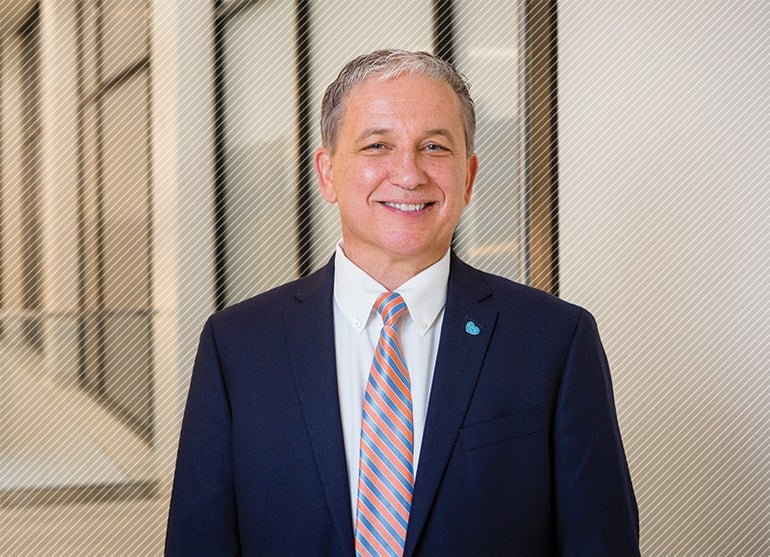Manzi keeps the community in community banking
 Photo | Nathan Fiske
Ed Manzi
Photo | Nathan Fiske
Ed Manzi
When Ed Manzi first got a taste of community banking decades ago, he knew he’d found his calling.
“A community bank, almost by definition, you’re very embedded in the lifeblood of the community you serve,” Manzi said. “I was like, ‘Oh my God, this is the perfect job for me.’”
Manzi had studied accounting at the University of Lowell, back before it was a UMass campus, and he’d spent some time at public accounting firms. But when he took a job as CFO of Winthrop Savings Bank, it started him off on a lifelong career.
At age 30, he was already a bank president and CEO, at Shirley Cooperative Bank. Then, in 1997, he became president at Fidelity Bank. He’s now been there for 21 years. While many of the state’s small banks have merged into big national and international financial businesses, Manzi has helped Fidelity Bank grow larger and compete with the big guys without losing its community focus.
When Manzi joined Fidelity Bank, the century-old bank reported total assets of $140 million and 48 full-time equivalent employees. Today, it’s worth $817 million and employs 143 FTEs.
“We’re very mission-driven, purpose-driven,” he said. “If you want to help more people than you did last year, you’ve got to grow.”
As the banking industry consolidated over the years, a number of smaller banks found their values lined up with Fidelity Bank’s and decided to become part of the Leominster institution.
“Banking is incredibly complicated and competitive,” he said. “If you’re not growing, you’re not going to survive.”
Fidelity Bank expanded its thrift bank model 15 years ago to support businesses as well as individuals and families. Today, Manzi said, more than half of the bank’s work is in business.
The bank has made a particular push into the Worcester market over the years and will open its newest branch on Front Street in the city this summer.
“It’s the hub of Central Massachusetts, and if you have mission like ours to help as many people as you can, you go where the people are,” he said.
Ask people close to Fidelity Bank what makes the bank – and Manzi – special parts of the Central Mass. community, and many will point to Fidelity’s LifeDesign philosophy. Joe Salois, CEO of Atlas Distributing Inc. in Auburn and a member of Fidelity’s board, describes LifeDesign as a commitment to consider whether any decision by the bank is good for its clients, employees and the community.
“Those questions have to be answered affirmatively before they proceed with something, so it’s really a good way of doing business,” Salois said.
Perhaps the most striking example of Fidelity’s commitment to LifeDesign is the SHINE Initiative, which it created in 2004. At the time, Manzi said, the bank was getting a lot of requests for donations, and it wanted to be more strategic with its philanthropy. Mental health was an area of significant unmet need Fidelity Bank employees were enthusiastic about addressing.
Today the SHINE Initiative has grown from an internal corporate effort into its own nonprofit organization with a full-time executive director, a staff and a strong balance sheet.
Paul Richard, executive director of SHINE, said Fidelity Bank not only supports the group with money and volunteer hours, but with efforts to shift the culture in the course of the business day.
“They’ve incorporated our mission into their everyday language, their interactions with customers,” he said. “They’ve been champions in promoting mental wellness and the true understanding of mental illness as an illness.”
After the drop in the federal corporate tax rate, the bank said it would raise its minimum wage to $14.25, with a commitment to reach $15 by 2020, give staff a $500 bonus, and add to its annual LifeDesign Community Dividend, supporting local nonprofits.
Looking to the future, Manzi said he’ll maintain a focus on a lesson he learned in his first months at Shirley Cooperative Bank. He recalls strangers walking into his office, sharing their dreams with him, and then following the advice he gave them – a humbling responsibility for a first-time executive just starting his job. While people may compare banks based on interest rates and branch locations, he said, those aren’t really the most central issues.
“When something happens in your life, it really matters who you’re doing business with,” he said.









0 Comments